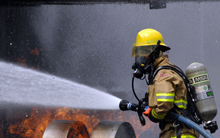Fire Fighter as a Career
 Firefighting career is chosen by those persons who are daring and desirous to work in odd circumstances. This profession is exciting, dangerous and can give great personal contentment. The main objective of Firefighters is to protect people and property. They rush to the spot of an accident or emergency first. Firefighters put out fires, which is not simple job. Fighting fires is risky and complex, and it takes organization and teamwork. Firefighters also save people who are trapped in burning buildings.
Firefighting career is chosen by those persons who are daring and desirous to work in odd circumstances. This profession is exciting, dangerous and can give great personal contentment. The main objective of Firefighters is to protect people and property. They rush to the spot of an accident or emergency first. Firefighters put out fires, which is not simple job. Fighting fires is risky and complex, and it takes organization and teamwork. Firefighters also save people who are trapped in burning buildings.
They treat people who are hurt or ill, both at fires and in other situations. Firefighters are called in medical emergencies. In between alarms, firefighters must clean and repair their equipment. They practice firefighting skills, and they may perform fire inspections. They exercise to be healthy. Fire marshals and fire inspectors work to prevent fires. They conduct building inspections. They check regularly that laws about fire safety are followed. They also work with builders and city planners. They often visit schools to coach fire safety.
Usually, firefighters live at fire stations. Most fire stations have living rooms, kitchens, and bedrooms. When the alarm sounds, firefighters must respond quickly. Some firefighters work at airports or in factories. Others work in forests and rural areas. Special firefighters, called smoke jumpers, fight forest fires. They parachute from airplanes to remote areas. The working conditions of Firefighting are dangerous. During a fire, floors can cave in and walls can collapse. Flames and smoke can burn or kill. Firefighters may expose contact with toxic gases or other hazardous materials. Firefighters wear protective gear to protect themselves. Many firefighters work more than 50 hours a week.
Education:Candidates who apply for municipal firefighting jobs must have to clear a written exam; tests of strength, physical stamina, coordination, and agility; and a medical examination that includes drug screening. Workers may be monitored on a random basis for drug use after accepting employment. Examinations are generally open to persons who are at least 18 years of age and have a high school education or the equivalent. Candidates who get the highest scores in all phases of testing have the best chances for appointment. If candidates complete community college courses in fire science, they may improve an applicant's chances for appointment. Entry-level workers in large fire departments are trained for several weeks at the department's training center or academy. Through classroom instruction and practical training, the candidates study firefighting techniques, fire prevention, hazardous materials control, local building codes, and emergency medical procedures, including first aid and cardiopulmonary resuscitation. They also learn how to use axes, chain saws, fire extinguishers, ladders, and other firefighting and rescue equipment. When they successfully complete this training, they are assigned to a fire company, where they undergo a period of probation. Classes in fire science at a community college may help people get a job. New firefighters often train at a special school. They learn to prevent fires. They study how to put out fires. They learn how to use axes, chain saws, fire extinguishers, ladders, and other tools. They study local building codes and emergency medical procedures, such as first aid. After completing this training, they are assigned to a fire station.
To become a firefighter, candidate must have some special characteristics which will fulfill job. These are confidence, flexibility, and ability to communicate effectively, integrity and have a commitment to diversity. Due to technological development in this field, the role of the firefighter is constantly changing. As a firefighter, candidate will be expected to undertake a continuous training program by attending lectures, exercises, practical training sessions and other forms of training to maintain competence levels. They have to develop skills and ensuring that their fitness levels are maintained as the work can be demanding, both physically and mentally.
Fire fighter Institutes:
- Nova Scotia Firefighters School, 48 Powder Mill Rd. Waverley, Nova Scotia, Canada B2R-1E9, 1-866-861-3823 Toll Free. Within Atlantic Canada (902) 861-3823 Local, nsfs@accesswave.ca
- Delhi Institute of Fire Engineering, RZ-579, Sir Chhottu Ram Marg, Raj Nagar Opp. Sector - 7, Dwarka, New Delhi- 110045, Ph: 011-32474700, 55724298, 25366517
- NCPT-National Centre for professional Training, PB.NO.50, Pandalam.P.O Pathanamthitta (Dist) , Kerala, South India Pin: 689501, Phone : ++9-4734-255177, 209209. Fax : ++94734-252101. Web : www.ncptindia.com
- The Institute of Engineering, Mathrubhumi Road, Thiruvananthapuram-695 035 Ph: 0471 - 2573380, 2573068.
- Institute of Fire and Safety Technology (IFAST), The Course Director, Institute of Fire and Safety Technology, xvii/229, NF Gate, Thripunithura, Kochi 682 301
- National Institute of Fire and Safety (NIFE), 50/1147, Railway Station Road, Edappally, Kochi. Ph: 0484 - 2800232, 280038, Website - www.nifeindia.com
- National Fire Academy, Ajwa Waghodiya Ring Road, Near Sardar Estate, Vadodara - 390019.
- Indian Institute of Fire Engineering, Maharaja Agrasen Plaza, R Z - B-11/2, 1st Floor, Mahavir Enclave, Main Palam Dabri Road, Opposite D V B Sub-Station, New Delhi-110045.
- MAEER's Maharashtra Institute of Technology, S No 124, Paud Road, Kothrud, Pune-411038. Phone 91 020 5431795, 5432767. www.mitpune.com
- Indian Institute of Fire Engineering, 1st Floor, Iqbal Manzil, Near SBI, Chhaoni, Katol Road, Nagpur-440013.
- International Institute of Fire Engineering, Safety and Security Management, Pune 411003.
- National Institute of Fire Management, Chennai 600008